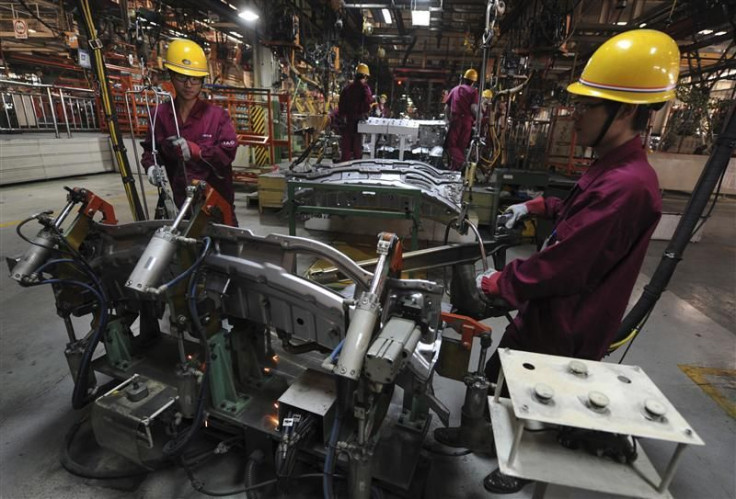China GDP at 2-1/2 Year Low but Beats Forecast

(Reuters) -- China's economy grew at its weakest pace in 2- years in the latest quarter, and it appeared headed for an even sharper slowdown in the coming months as export demand fades and the housing market falters.
The fourth-quarter year-on-year growth of 8.9 percent, although slightly stronger than the 8.7 percent that economists polled by Reuters had predicted, may give Beijing yet another reason to gently ease monetary policy, most likely by reducing the amount of reserves that large banks must hold.
The data may not satisfy investors, who were looking for figures that were either weak enough to provide a clear-cut case for policy easing or strong enough to allay fears that the world's second-biggest economy might unravel.
The fourth-quarter growth rate was the slowest pace since the second quarter of 2009, when the global economy stumbled out of a deep recession.
Analysts widely expect China's year-on-year growth rate to slow even more dramatically in the first quarter of 2012, possibly breaching the 8 percent threshold seen as the minimum for assuring sufficient job creation.
Further weakness lies ahead, Mark Williams, an analyst at Capital Economics, said before the fourth-quarter data was released.
European demand for Chinese products has already slowed and is likely to remain subdued. The outlook for real estate construction -- a 10th of GDP -- is potentially an even greater concern.
Europe is China's top export market, and all signs point to much of the continent falling into recession in coming months, with no end in sight as governments push austerity programs.
Mass ratings downgrades in the euro zone over the weekend and a breakdown in Greek bailout talks have added to financial market jitters.
NEW YEAR SKEW
An early Lunar New Year holiday on January 23-24 probably skewed the fourth-quarter data and the effect will likely linger through the first three months of the year. Factories typically step up production to clear orders before the festive period, and then temporarily shut down as workers head home to visit family.
That means fourth-quarter growth probably benefited from the surge in manufacturing, while first-quarter activity will be even slower.
We are in a period where the early Chinese New Year is boosting activity ahead of the holiday, which is setting us up for a disappointment after, Ken Peng, an economist at BNP Paribas, said before the data release.
Peng sees China's annual economic growth slipping to 7.9 percent in the first quarter, the worst in three years.
A BOTTOM IN Q1?
Other Chinese data painted a mixed picture.
Retail sales grew 18.1 percent from a year earlier, faster than the consensus of a Reuters poll of 17.2 percent. Industrial output also exceeded expectations, up 12.8 percent year on year, but fixed asset investment was slightly softer than anticipated at 23.8 percent.
It's almost certain now that China's economic growth will touch a cyclical bottom in the first quarter of 2011 before rebounding in the second quarter, said Hua Zhongwei, an analysts at Huachuang Securities in Beijing.
Some analysts think a more pronounced economic slowdown in the first quarter could be a blessing in disguise of sorts.
It may compel stability obsessed Beijing to unveil more stimulus measures this year, giving the Chinese and world economies the lift that many investors are hoping for.
Possible stimulus could include further cuts in the levels of reserves that banks need to set aside at the central bank, and more aggressive state investment aimed at providing more public housing for low-income households.
When growth dips to below 8 percent, the political consensus for protecting growth will be stronger. That helps to bring back activity, Peng from BNP Paribas said.
($1=6.3066 yuan)
(Reporting by Koh Gui Qing; Writing by Emily Kaiser: Editing by Kim Coghill and Neil Fullick)
© Copyright Thomson Reuters 2024. All rights reserved.




















